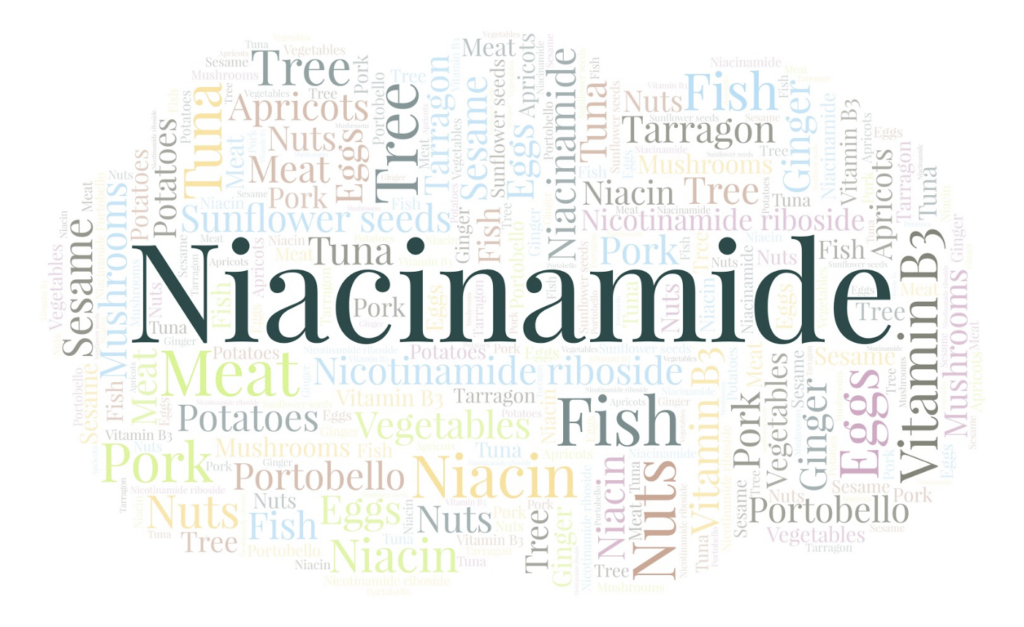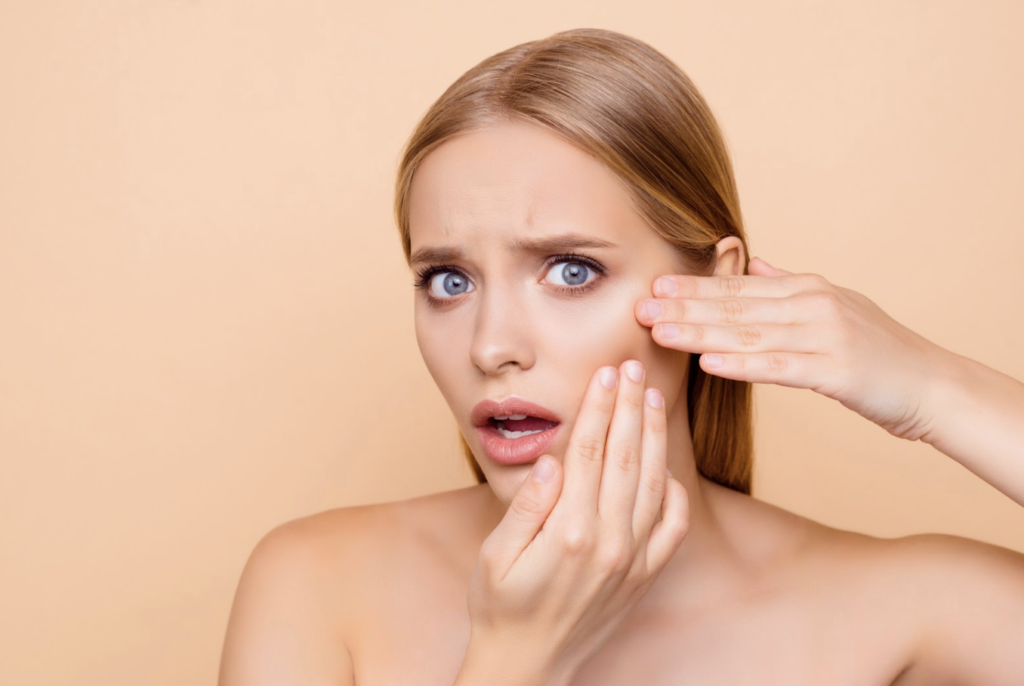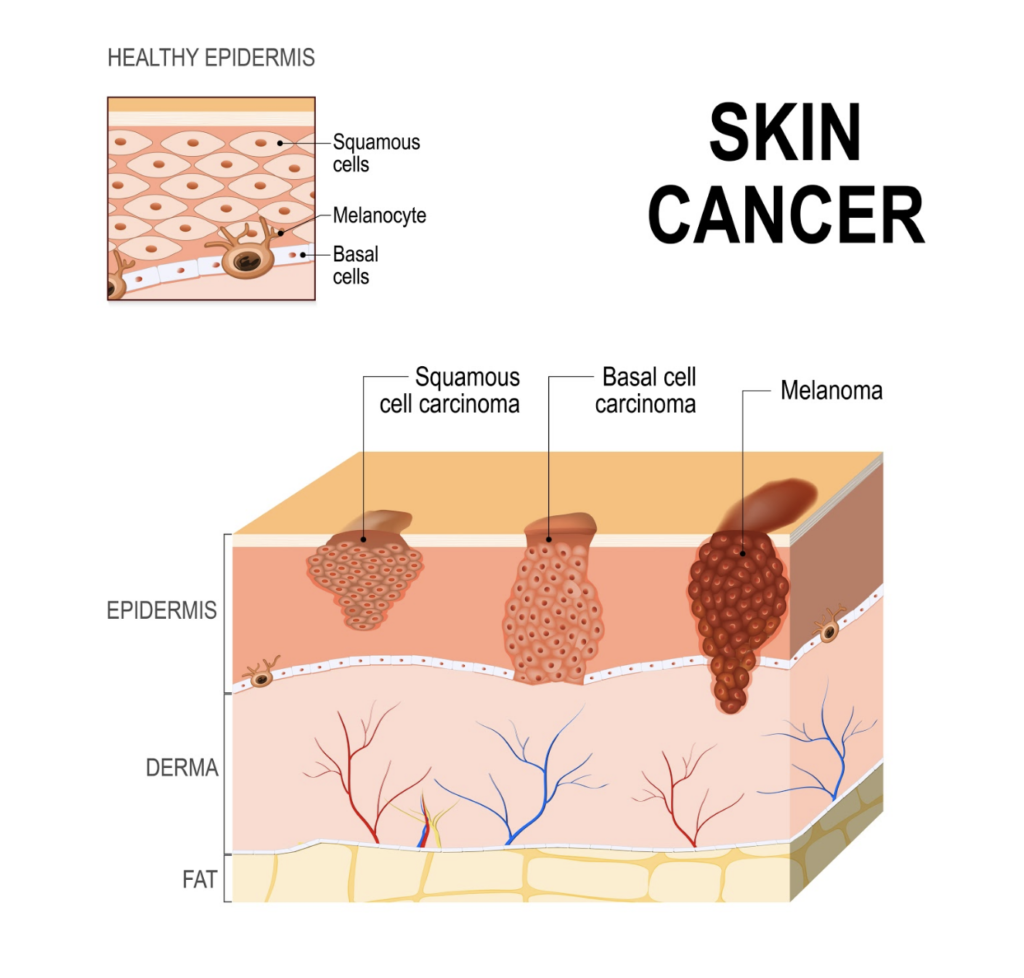In order for our bodies to maintain healthy function, they require essential vitamins. For our skin, one of these important requirements is niacinamide.
Niacinamide is a form of vitamin B3 that can improve the appearance of skin, treat several skin conditions, and can help prevent some skin cancers such as squamous cell carcinoma, basal cell carcinoma and melanoma.
Let’s take a good look at why you may want to add niacinamide to your skincare routine.
What is niacinamide?
Niacinamide, also called nicotinamide, is a form of vitamin B3. Vitamin B3 is an essential nutrient found in food, used as a dietary supplement, and even as medication. B3 converts the food we consume into energy that helps the body function properly. Foods high in B3 include:
- Green vegetables
- Meat
- Fish
- Legumes
- Mushrooms
- Nuts
- Milk
- Eggs
- Grains
Niacinamide (B3) can also be found in B-complex supplements, which contain all eight B vitamins: thiamine (B1), riboflavin (B2), niacin (B3), pantothenic acid (B5), pyridoxine (B6), biotin (B7), folate (B9) and cobalamin (B12).
Niacinamide is not to be confused with niacin.
These similarly named compounds are two different forms of vitamin B3. Niacin is also known as nicotinic acid. However, there are some key differences between the properties and benefits and it is important to not confuse the two.
At high doses, the effect of niacin and niacinamide can be quite different. High niacin doses can cause skin flushing, causing blood vessels to widen and can be used to help treat high cholesterol.
Niacinamide does not cause skin flushing and niacinamide should not be used for treating high cholesterol or high fat levels in the blood, as it has no effect on fats like niacin does.
Both are water-soluble and well-absorbed when taken orally.
Niacinamide comes in the form of oral supplements, as well as a topical gel or cream.
Niacinamide is in leave-on skin products, serums, and facial moisturizers. When applied topically, changes to your skin may be observed after eight weeks of routine use. Changes may include smoother, toned, and hydrated skin. If no changes are observed, you may want to schedule a consultation with a dermatologist to assess your skin issues.
Benefits of Niacinamide and Uses
When taken as a supplement or in the form of skin care products, niacinamide can help treat skin conditions like eczema, acne, and pre-skin cancers and some skin cancers. It is anti-inflammatory and may encourage the skin to build keratin, retain moisture, and regulate oil.
Niacinamide may also show improvements in skin issues like hyperpigmentation spots and fine lines and wrinkles. It’s beneficial for all skin types and skin tones.
Not having enough B3, known as a B3 deficiency, can lead to disorders of the skin, kidneys, and brain. Taking niacinamide can help with a B3 deficiency. Niacinamide can be used to treat pellagra — a niacin deficiency that comes with several symptoms including dermatitis, dementia, and diarrhea.
1. Clears Acne
Using niacinamide as part of your daily skincare routine may be a great way to help achieve acne-free skin. Research shows that it can help treat acne. Sebum, an oily substance present in the skin, can lead to acne if it is in excess. Niacinamide can help to regulate the oils in the skin that the sebaceous glands produce.
In cases of severe acne, the anti-inflammatory properties in niacinamide can help to manage inflammatory lesions.
In a 1995 double-blind study published in the International Journal of Dermatology, 4% niacinamide treated acne in humans just as well as clindamycin, which is a topical antibiotic that doctors will often prescribe for patients as an acne treatment. Niacinamide was applied twice daily for up to 8 weeks.
The results of the study were very impressive — not only did niacinamide match the topical antibiotic in effectiveness, researchers determined the niacinamide treatment was a better one. Unlike conventional acne treatment, niacinamide gel did not result in the growth of antibiotic-resistant bacteria on facial skin.
Similar results have been repeated in more recent years.
Suggested Dosage
- 4% niacinamide cream applied twice daily
2. Reduces Skin Inflammation
Niacinamide is an antioxidant with anti-inflammatory properties. These properties help to reduce redness or blotchiness of the skin. Inflammatory skin diseases are the most common problem in dermatology and include dermatitis, rosacea, and heat rash.
These skin conditions often come with itching and pain and can sometimes be chronic. When applied topically or taken as an oral supplement, niacinamide has anti-inflammatory effects on skin.
Rosacea is a facial skin disorder that causes sensitive skin and redness. Niacinamide may be able to treat this condition, reducing redness and itching.
One 2004 study on the effects of niacinamide on the skin states:
“It is possible to demonstrate anti-inflammatory effects in acne, rosacea and nitrogen mustard-induced irritation. Because of its verifiable beneficial effects, niacinamide would be a suitable component in cosmetic products for use in disorders of epidermal barrier function, for aging skin, for improving pigmentary disorders and for use on skin prone to acne.”
The study also suggests that application of niacinamide can improve the surface structure of ageing skin and smooth out wrinkles. Additionally, niacinamide has the ability to help minimize pore appearance, keeping the skin moisturized.
Suggested Dosage
- 4% to 5% niacinamide gel applied once daily
- 500 milligrams daily
3. May Prevent Some Skin Cancers
Niacinamide may decrease the risk of pre-skin cancers (actinic keratoses) and skin cancers, such as squamous cell carcinoma, basal cell carcinoma, and melanoma, in those who are at high risk.
In Melanoma, niacinamide may enhance repair of DNA damage in melanocytes, and it a “promising agent for the chemoprevention of melanoma in high-risk populations.” Melanoma is a type of skin cancer that occurs when the pigment-producing skin cells, or melanin, become cancerous.
Symptoms of melanoma include darkening of the skin and mole color changes. Exposure to ultraviolet (UV) radiation may trigger this type of cancer. Treatment of melanoma can involve medications, radiation or surgery.
One 2009 study on how oral niacinamide protects against UV radiation concluded that niacinamide is a safe and inexpensive chemopreventive supplement for reducing the immunosuppressive effects of sunlight. Doses between 500 and 1,500 milligrams were administered daily during this trial.
In 2015, Chen et al. published the results in the New England Journal of Medicine on their pivotal double-blind, randomized, controlled study regarding the potential impact of nicotinamide (niacinamide) on the rate of new non-melanoma (basal cell carcinomas and squamous cell carcinomas) in at risk patients.
In this study, patients who had a history of two or more non-melanoma skin cancers were randomly assigned to a group that received niacinamide 500 milligrams twice daily or placebo twice daily. “At 12 months, the rate of new nonmelanoma skin cancers was lower by 23% (95% confidence interval [CI], 4 to 38) in the nicotinamide group than in the placebo group (P=0.02).“ Because of this study, in our clinic we discuss the role of niacinamide in our patients that have multiple non-melanoma skin cancers as a potential supplement that may help from the inside out in addition to diligent sun protection with clothing and sunscreen.
Suggested Dosage
- 500 milligrams twice daily
Side Effects
Side effects of niacinamide are minimal. If taken at high doses, problems can occur. Additionally, do not take niacinamide if you have kidney problems or have kidney disease or are taking blood thinners. Some types of kidney disease can be aggravated by niacinamide and niacinamide may interact with some blood thinners.
Research suggests that niacinamide may increase insulin resistance, a symptom of type 2 diabetes, so be cautious with this supplement if you are insulin resistant or know you’re diabetic.
Minor adverse effects of niacinamide may include upset stomach and dizziness.
Supplement Safety Recommendations
As you have probably heard, there is not as much regulation of over-the-counter supplements. Yet, many people decide to take them without considering potential side effects. Remember, just because something is natural or a supplement doesn’t mean it’s safe. Here are some tips and guidelines to be aware of prior to and when taking any supplement or natural products.
- Consult your health care provider before you begin any new supplement or natural product to be sure it’s the best fit for your unique health condition.
- If you are undergoing treatment for any health conditions, consult your health care provider before adding any supplements or natural products to your regime. There might be interactions with your prescription medications and with lab monitoring of some health conditions.
- While reactions can be rare to supplements, they can occur in anyone. If you have any side effects, allergic reactions, or health concerns after taking a supplement, stop the supplement immediately and seek evaluation from a health care provider.
- If you are pregnant or breastfeeding, consult your physician for guidance on the safety of supplements and natural products.
- Do not exceed the recommended dosage and consult your health care provider for potential medication and supplement interactions and cumulative dosing of ingredients in products.
In Summary
- Niacinamide, a form of vitamin B3, has many health benefits, including the improvement of skin inflammation and treatment of skin disorders.
- Niacinamide is not to be confused with niacin, as the two have different properties and benefits.
- This nutrient is included in many skincare products like serums and facial moisturizers.
- Studies have shown that niacinamide can be used as a treatment of acne. It regulates the oil in skin and manages inflammatory lesions that acne causes.
- The anti-inflammatory properties of niacinamide help to reduce inflammation, redness, or blotchiness of the skin. It may also be used to improve aging skin and smoothing out wrinkles.
- Niacinamide may decrease melanoma and other types of skin cancers by protecting against UV radiation.
Sources
- Hill, L. J., & Williams, A. C. (2017). Meat Intake and the Dose of Vitamin B3-Nicotinamide. International Journal of Tryptophan Research. Full text: https://www.ncbi.nlm.nih.gov/pmc/articles/PMC5419340/
- Prousky, J., & Seely, D. (2005). The treatment of migraines and tension-type headaches with intravenous and oral niacin (nicotinic acid): systematic review of the literature. Nutrition journal, 4(1), 3.: https://nutritionj.biomedcentral.com/articles/10.1186/1475-2891-4-3
- Minto, C., Vecchio, M. G., Lamprecht, M., & Gregori, D. (2017). Definition of a tolerable upper intake level of niacin: a systematic review and meta-analysis of the dose-dependent effects of nicotinamide and nicotinic acid supplementation. Nutrition reviews, 75(6), 471-490. : https://www.ncbi.nlm.nih.gov/pubmed/28541582
- Knip, M., Douek, I. F., Moore, W. P. T., Gillmor, H. A., McLean, A. E. M., Bingley, P. J., … & ENDIT Group. (2000). Safety of high-dose nicotinamide: a review. Diabetologia, 43(11), 1337-1345. : https://www.ncbi.nlm.nih.gov/pubmed/11126400
- Khodaeiani, E., Fouladi, R. F., Amirnia, M., Saeidi, M., & Karimi, E. R. (2013). Topical 4% nicotinamide vs. 1% clindamycin in moderate inflammatory acne vulgaris. International journal of dermatology, 52(8), 999-1004.: https://onlinelibrary.wiley.com/doi/abs/10.1111/ijd.12002
- Draelos, Z. D., Matsubara, A., & Smiles, K. (2006). The effect of 2% niacinamide on facial sebum production. Journal of Cosmetic and Laser Therapy, 8(2), 96-101.: https://www.tandfonline.com/doi/abs/10.1080/14764170600717704
- Niren, N. M. (2006). Pharmacologic doses of nicotinamide in the treatment of inflammatory skin conditions: a review. Cutis, 77(1 Suppl), 11-16.: https://www.ncbi.nlm.nih.gov/pubmed/16871774
- Shalita, A. R., Smith, J. G., Parish, L. C., Sofman, M. S., & Chalker, D. K. (1995). Topical nicotinamide compared with clindamycin gel in the treatment of inflammatory acne vulgaris. International journal of dermatology, 34(6), 434-437. : https://www.ncbi.nlm.nih.gov/pubmed/7657446
- Gębicki, J., Sysa-Jędrzejowska, A., Adamus, J., Woźniacka, A., Rybak, M., & Zielonka, J. (2003). 1-Methylnicotinamide: a potent anti-inflammatory agent of vitamin origin. Pol J Pharmacol, 55, 109-12.: https://www.ncbi.nlm.nih.gov/pubmed/12856834]
- Gehring, W. (2004). Nicotinic acid/niacinamide and the skin. Journal of cosmetic dermatology, 3(2), 88-93. https://www.ncbi.nlm.nih.gov/pubmed/17147561
- Minocha, R., Damian, D. L., & Halliday, G. M. (2018). Melanoma and nonmelanoma skin cancer chemoprevention: A role for nicotinamide?. Photodermatology, photoimmunology & photomedicine, 34(1), 5-12. : https://www.ncbi.nlm.nih.gov/pubmed/28681504
- Yiasemides, E., Sivapirabu, G., Halliday, G. M., Park, J., & Damian, D. L. (2008). Oral nicotinamide protects against ultraviolet radiation-induced immunosuppression in humans. Carcinogenesis, 30(1), 101-105.: https://www.ncbi.nlm.nih.gov/pubmed/19028705
- Chen AC, Martin AJ, Choy B, Fernández-Peñas P, Dalziell RA, McKenzie CA, et al. A Phase 3 Randomized Trial of Nicotinamide for Skin-Cancer Chemoprevention. N Engl J Med 2015;17:1618–26. https://www.ncbi.nlm.nih.gov/pubmed/26488693





